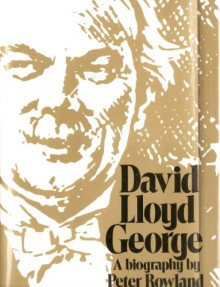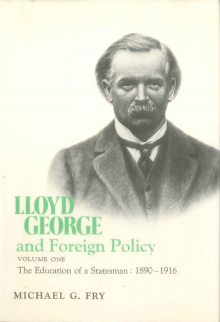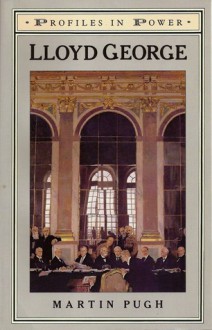
Though often overshadowed by his Second World War counterpart Winston Churchill, David Lloyd George had a political career that was nearly as long and just as impressive in its accomplishments. Born in Manchester in 1863, the young David moved with the rest of his family to Llanystumdwy after the death of his father, where they were taken in by David's uncle Richard Lloyd. Excelling in school, he embarked on a career as a solicitor, though this soon proved to be a stepping stone into politics. Rowland depicts the young politician as actively focused on Welsh issues, particularly disestablishment and land reform. Yet his ambitions soon propeled the young MP beyond the boundaries of regional concerns, and beginning with his active - and controversial - stand against the Boer War he emerged as an increasingly prominent member of the `Radical' wing of the Liberal Party.
With the formation of the Liberal Government in the aftermath of Balfour's resignation, Lloyd George took office, first as President of the Board of Trade, then as Chancellor of the Exchequer after Asquith's promotion to the premiership in 1908. As Chancellor he supervised the passage of a bill granting old age pensions and championed the cause of a comprehensive land valuation as a prelude to taxing the great landlords of Britain. The increased financial burden caused by the pensions, coupled with the growing expenditures on the navy, led to the introduction of the famous `People's Budget' in 1909 and the political showdown which resulted in two general elections and the emasculation of the House of Lords.
Soon after his success in this battle, Lloyd George began his long-term romantic relationship with Frances Stevenson, who went from being tutor to his daughter Megan to his private secretary. She proved to be the most enduring of the many affairs Lloyd George embarked upon during his lifetime. Rowland does not downplay Lloyd George's habitual philandering, and the relationship between Lloyd George and his first wife Margaret is depicted as having reached a mutual understanding on the matter. Despite these affairs, Lloyd George retained a deep affection for Margaret, and Rowland notes that the maintenance of their marriage ensured his political survival.
Like million of other Britons, Lloyd George's life was changed by his country's entry into the First World War. Initially hesitant about involvement, he soon chafed at the government's conduct of the war. As a result of the `shells scandal' he became the head of a new Ministry of Munitions, where he circumvented War Office inertia in equipping Britain's growing army. Rowland states that these efforts to transform Britain into a nation at war were Lloyd George's greatest contribution to Britain's victory, and they increasingly marked him out as the most dynamic member of the government. In spite of his continued dissatisfaction with Asquith's conduct of the war, however, Rowland argues that Lloyd George would have preferred to work as a `power behind the throne' rather than as Asquith's replacement. Yet when Asquith resigned in December 1916, Lloyd George took office as the only person capable of maintaining the governing coalition.
As prime minister, Lloyd George presided over a government composed of the Unionist Party and the Liberals who chose not to follow Asquith's example in resigning. His greatest battles at this time were with the military, particularly with General Haig and his command of British forces on the Western Front. Rowland is good at recounting the political infighting that comprised this struggle, noting the limitations to the Prime Minister's authority even at this stage of the war. Perhaps the greatest limitation on his power, though, was the Unionist domination of his government. While Lloyd George worked well with the Unionists with whom he governed, his dependence on their parliamentary support - which only increased after the postwar `coupon' election of 1918 - left him dangerously vulnerable to their goodwill for his continued survival.
The end of the war thus left Lloyd George in a dominant yet tenuous position. As a key participant in the Paris peace negotiations he relished his role as a world statesman, though his belief in conciliation was hampered by French intransigence. Back home Lloyd George faced a number of crises, particularly with skyrocketing unemployment and the increasingly violent opposition to British rule in Ireland. Though Lloyd George ultimately cobbled together a solution, the resulting partition alienated many of the rank-and-file in the Unionist parliamentary party, and this, coupled with his blatant sale of honours and his efforts to manipulate public opinion, ultimately cost him his premiership. Lloyd George rejoined the weakened Liberals in opposition, but his continued tension with Asquith's supporters diminished his influence in the party, while his dynamic solutions to the ongoing unemployment problems of the interwar period were ignored by both the Conservatives and the Labour Party.
Faced with a career as long and accomplished as this, Rowland was faced with a challenge to compress everything into one volume. Often this forces him to pass over events by noting that the details were recounted elsewhere - a regrettable but understandable device considering the scope of his project, though it would have been helped if he noted which volumes the reader could turn to for additional detail. More problematic is his heavy reliance on the diaries of Lord Riddell for much of his information, a source that most historians treat with skepticism. Nevertheless, the overall result is the best one-volume biography of Lloyd George available, a valuable summary of the life and times of a dominant political figure in modern British history.


 Log in with Facebook
Log in with Facebook 








